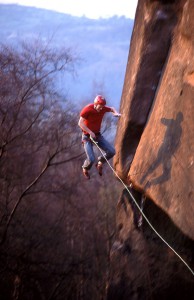
Taking the fall on a flash attempt of Gaia, E8 6c
© Alex Messenger
There’s definitely something in the saying; there’s bold climbers and old climbers but not old bold climbers. A number of recent events, like Franco Cookson decking from 20m, and finding this Malham video, got me thinking quite a lot about how my climbing’s changed over the last 15 years and how the UK (or perhaps UKC) perceives trad climbing.
The UK has something that much of the rest of the world doesn’t have, that isn’t trad climbing, you can see plenty of that going on in France if you look in the right places. It’s a perception from some that bold climbing is its own sub sport, or more broadly that their “sport” is better than any else’s. One that elevates you above your peers, one that makes you a good climber, one that makes you famous. We all know climbing is dangerous, Petzl labels tell us every time we buy gear, UKC disclaims itself everytime we log on, it’s part of why we do it but should it be almost all of why we do it?
Anyone can be a bold climber, you can be a bold HS climber, or a bold E10 climber. Climbing bold routes doesn’t make you an unsafe climber but not being technically ready for bold routes does. So does climbing for boldness sake; just to get that technically “easy” tick. Sure it’s rewarding, scaring yourself can be great “type 2 fun” but it’s very easy to push the boat out too far.
Years ago I was a taking the “easy” ticks, I flukily scraped through quite a few E7s and 8s without being particularly good. And then came an enforced lay off after a fall soloing a rather insignificant route a Burbage. I like to think I learned something from that; not something that holds me back but something that pushes me on.
It’s much like the saying, “everything else is just training for mountaineering.” Maybe. I rate mountaineering, it’s probably my favourite bit of the sport, but it doesn’t mean I can excuse myself for being bad at sport climbing. If I get better at sport climbing, I usually get better at most other styles of climbing including mountaineering. I guess it’s fine to see it as training if you must, but I often see those that predominantly train often transfer to trad much easier than the other way round.
Naturally the same goes for trad climbing. Look at James Pearson’s recent Pembroke foray. Now I always knew he was good, but that really takes it to the next level. A bold level, but not really an unsafe level for him nowadays. Pretty much all as a result of some time spent focusing on sport climbing.
Caveat-ed only with the rule that you shouldn’t damage the rock, clearly everyone has the right to climb how they want. However, my take is that progression generally requires structure and scaffolding, much like James has applied. The odd top rope, the odd headpoint, the odd boulder or sport route, they all lead up to the ideal. But you usually know when you’re about to push the boat out too far. So, anchor in the boat, control the ego, patience is a virtue, and in this game it keeps you alive.